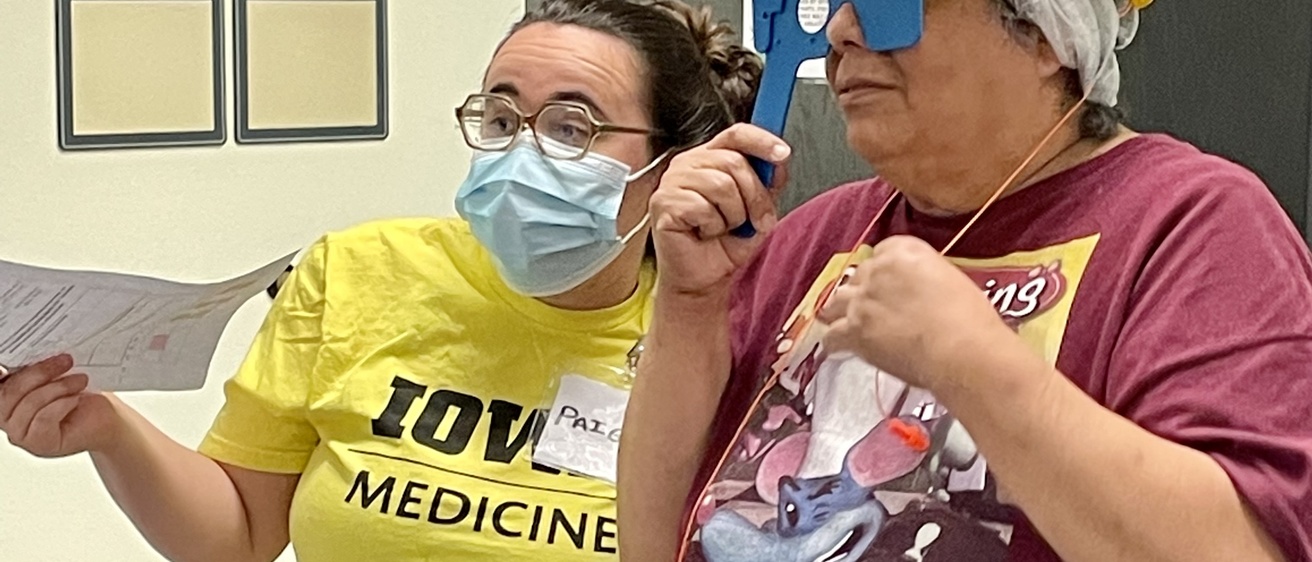University of Iowa students, researchers, and community partners come together to advance health equity across the state through the Equity in Health Science Practice Program
The three-year grant from the University of Iowa Strategic Initiatives Fund works to uplift communities struggling with healthcare access
Now in its second year, this ambitious public health program aims to bring University of Iowa researchers, students, and advocates together with community leaders and partners to tackle health equity and access issues faced by marginalized and underrepresented populations.
This unique combination of cultural sensitivity, hands-on community engagement, health practice, and a direct focus on leadership from community voices is making substantial progress toward improving the lives of Iowans with limited access to healthcare across the state.
The Equity in Health Science Practice (E-HSP) Program, funded through a three-year, $758,000 grant from the University of Iowa Strategic Initiatives Fund, is focused on campus and community engagement throughout Iowa to promote health equity, including translating research into public health and clinical practice.
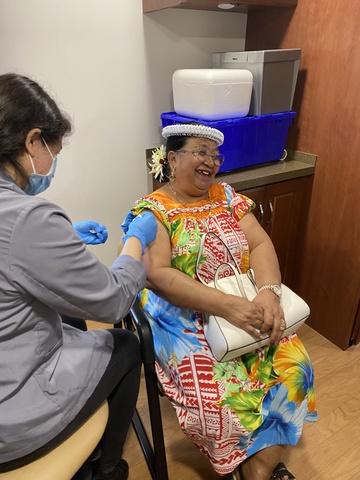
The grant is funded for three years, with the potential to reach communities in any of Iowa’s 99 counties to reach those who work and live within the state.
The first phase of the grant focused on COVID-19, and the second was on diabetes. The initial community partnership formed to begin working with these issues was in Storm Lake, IA, whose immigrant, and refugee population has experienced disparately higher rates of both.
COVID-19 and diabetes are connected due to the disruption the pandemic has caused to diabetes care and discoveries that link COVID-19 and diabetes more directly. Patients who have had covid are more likely to get diabetes, and patients with diabetes are more likely to get severe covid.
E-HSP helps support patients affected by one or both of those conditions and identifies ways to improve access to care and bring new treatments into communities.
"These are all things we are exploring as we work directly with campus and community partners, including more than a dozen student leaders from the University involved in this effort," said Martha Carvour, a faculty member at the University of Iowa College of Medicine and principal investigator for E-HSP.
The University of Iowa has tasked E-HSP with building a solid framework for sustainable health equity research collaborations across the institution and the state, a more permanent and enduring program to advance health equity across Iowa by the end of the grant’s third year.
The Centers for Disease Control and Prevention (CDC) define Health Equity as when every person has the opportunity to “attain full health potential” and no one is “disadvantaged from achieving this potential because of social position or other socially determined circumstances.” Health inequities are reflected in differences in length of life; quality of life; rates of disease, disability, and death; severity of disease; and access to treatment.
Health Equity includes many fundamentals of diversity, inclusiveness, and justice – which are all embedded in the work that E-HSP is doing in Iowa communities.
“When doing this kind of work, you must have a lens of Diversity, Equity, and Inclusion (DEI) to ensure health equity,” said Aloha Wilks, program coordinator for E-HSP. “You should never turn that off, regardless of your working space.”
Wilks and Carvour have worked together to address gaps and create medical interventions for Iowa communities with significant numbers of underserved populations with the greatest need in accessing healthcare amid the ongoing pandemic.
In Storm Lake, those interventions began with a diabetic foot study, a COVID-19 survey, and a series of health fairs designed to address the most pressing health issues shared by community leaders.
“When we went to Storm Lake, we focused on immigrant and refugee populations and employees of the Tyson Foods plant,” Wilks said. “We gathered information from the community from a cultural perspective and focused on meeting them where they were.”
In response to feedback from the Tyson Corporation, E-HSP conducted a health fair in partnership with Salud!, a multicultural health coalition in Storm Lake, to address chronic medical conditions and illnesses impacting employees, potentially keeping them from work. Diabetes, hypertension, and obesity were the top three.
PARTNERING WITH HEALTH EQUITY CHAMPIONS IN STORM LAKE
Salud! was initially formed to advance health equity and well-being for Storm Lake residents. However, programming and interpretive workshops have drawn people from neighboring counties, especially with Zoom meetings broadening reach beyond Buena Vista County, IA.
“Other people that want to join us or benefit from our programming are welcome,” said Di Daniels, co-director and founder of the Salud! Multicultural Health Coalition. “Although our focus will always primarily be on the well-being of immigrant and asylee/refugee populations here in Storm Lake.”
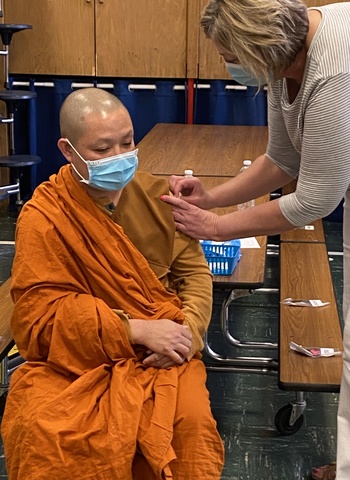
Salud! has a history of health-focused events going back over ten years, reaching thousands of residents while emphasizing the importance of cultural sensitivity, partnership development, and education as the key to connecting with immigrant and refugee populations.
The conversation about forming a partnership between E-HSP and Salud! had just begun when COVID-19 brought new health challenges to the community in Storm Lake, which then led the program to become a double focus on COVID-19 and diabetes.
Emilia Marroquin, a community member from Storm Lake and supporter of Salud! for the past ten years, serves on the local school board and works with educational programs that outreach with community members to raise awareness about access and the importance of programs, especially with COVID-19 vaccine.
"We recognize that we are working with minorities that need services and the education about those services," Marroquin said. "It's not just about getting the COVID-19 vaccine; we must educate them first. That's the reality of working with these communities."
"Opening the doors of Walmart or Hy-Vee and having free vaccinations wasn't necessarily going to draw people," Daniels said. "We also had to find community leaders in the Laotian, Micronesian, and Latino communities, go to them and say, 'would you be interested in this and when, where, and how can we begin to reach people.'"
With the support and insight of local community leaders and an educational framework for promoting the COVID-19 vaccine, Salud! began moving forward in partnership with E-HSP, which shared their philosophy of putting cultural humility at the forefront.
The Journal of Applied Nursing Research describes cultural humility as critical to advancing health equity and a fundamental precept for clinical researchers looking to understand and eliminate health disparities through honest and trustworthy relationships.
"We embed everything we do in cultural humility, and the team from the University of Iowa truly exemplified that, which led to an impactful partnership," Daniels said. "We recognized our position was listening to community members, hearing their felt needs, and acting on them."
"Ultimately, we are an organization explicitly focusing on serving the community," Marroquin said. "We are the connection between the community's needs and the resources out there and that connection creates trust.”
BRINGING IN COMMUNITY VOICES TO LEAD THE CONVERSATION
"Direct engagement takes time for individual communities," Carvour said. "Our goal is to stress quality and trust and ensure we build infrastructure and keep our commitments to the communities we serve and our partnership with Salud! and Storm Lake has been terrific in exemplifying the university's commitment."
The community engagement approach was fundamental to ensuring E-HSP was community-focused while designing training programs and deploying research projects informed by those experiencing diabetes, COVID-19, or who have been frontline workers during the pandemic.
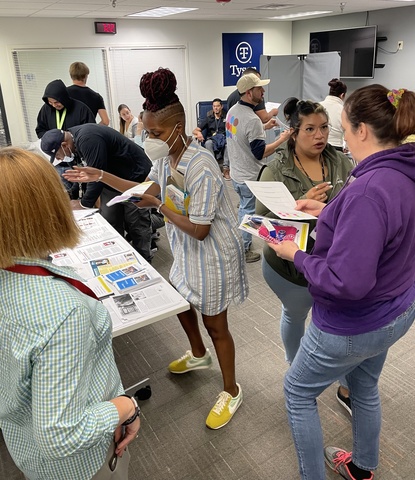
"We wanted to ensure that we were connected to and investing in communities," Carvour said. "We also wanted to hear from communities about how our work as a university can better serve them."
One of the primary ways that E-HSP fulfills this mission is by making research studies and participation in their community advisory board open to community involvement across Iowa.
The E-HSP community advisory board includes representatives and advocates from different sectors across the University of Iowa and the state, including the College of Education and Public Health and Salud!, and Tyson Foods members.
"We are committed to recruiting a diverse team of representatives across sectors,” said E-HSP Program Coordinator Aloha Wilks. “We are very deliberate about that; we openly recruit and welcome any feedback or input anybody might have.”
Maintaining a close relationship with community leaders while leveraging input from a diverse advisory board allowed E-HSP to process direct feedback about health needs and programming and intervene in real-time.
“That is a considerable difference from other work and grants,” Wilks said. “It is not a whole bunch of meetings and approvals. We've already done that when we obtained the grant. Now we can decide – we can start to engage with communities, get their feedback and be able to do something right away.”
A UNIQUE APPROACH TO IMPACT THROUGH ENGAGEMENT
"It's unusual to have that kind of sensitivity and work ethic from such a large organization," said Di Daniels, co-director of Salud!."Never have I seen the level of engagement from another entity than with this group. Even before E-HSP came to Storm Lake, I could tell what they were willing to do just by their questions."
Past partnerships between outside organizations and Salud! in Storm Lake have focused on observing and collecting data while the organization conducted health screenings and interacted with community members.
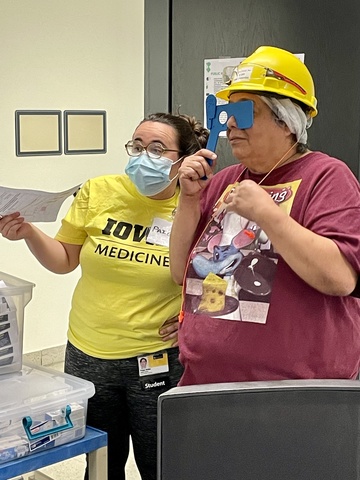
E-HSP’s approach was different because University of Iowa researchers and students immediately took a hands-on approach to lead efforts, connecting with community leaders and conducting and managing health fairs.
“I was so used to doing all the labor-intensive stuff that it was pretty remarkable when I finally realized they were asking for connections,” Daniels said. “E-HSP came and wanted to take the lead, do the work, and do it correctly, which was something new for Salud! They also took the time to get to know the area and the people."
Aloha Wilks visited Storm Lake and participated in projects to get to know the community better, including Friends with Food, which addresses food insecurity by delivering meals to homebound people once a month.
"Aloha fully engaging with a good cross-section of the community, among volunteers and recipients, links together to demonstrate the care and intention of E-HSP," Daniels said.
By engaging with communities directly, Wilks was also able to identify gaps in access to health and dental care for children with limited transportation or insurance coverage. After meeting with the community advisory board about the need for pediatric dentistry in Storm Lake, Wilks reached out to the College of Dentistry to start finding and implementing solutions.
“I work with hospital leadership on DEI issues, so I already had some connections,” Wilks said. “I met with Dr. Michelle McQuistan at the dental school and told her about the health equity work we were doing at Storm Lake, and she jumped right in. We were then able to get two students to come help with the health fairs.”
Students from the College of Dentistry were among several University of Iowa students assisting with the setup, administration, and management of health care stations at health fairs in Storm Lake, including one at a church and one at a Tyson Foods plant.
"Health fairs are very popular at Tyson, which include diabetes and blood pressure screenings, vision and dental care – people love them because we come to their workplace," Daniels said. "For some, this is the only time they can get care. When they have a few hours off, they collapse. They don't necessarily have time to go to the clinic."
Building out the stations at Tyson had to be run like clockwork to accommodate employees coming in during breaks, and everything had to be done in minutes to make the rounds in a cramped space.
"I was surprised by their level of engagement," Daniels said. "The E-HSP staff and students came ready, boots on the ground, and dealt with all the hiccups – because there were many of them, and it was impressive."
University of Iowa students and E-HSP researchers professionally managed the health fair while being respectful to attendees and engaging with the community beyond expectations.
"The health fair in the church was just as grueling, but there were times for playfulness – we had activities outside for kids as well," Daniels said. "Some students spent their free time engaging with kids outside and ensuring that everybody's work was going well. That adaptability and seeing people go out and be part of the outside activities, making time for that and not just focusing solely on their section; there was a different feel to those clinics."
“They engaged with every single activity that was happening and were very professional,” said Emilia Marroquin from Salud! “This is something that the community feels. You can see people commenting on how fun and helpful the students were, which makes you feel like you are doing the right thing.”
Previous partnerships between Salud! and area high school students and interns have been more focused on the benefits of learning civic engagement to graduate with honors.
"There are "volunteers," and there are volunteers," Daniels said. "When somebody comes as a volunteer, we expect them to recognize that this is a place of privilege, that they are getting something."
"For University of Iowa students, there was nothing to show," Daniels said. "They came super ready and very engaging and patient. It is grueling work for them for 24 hours. Back-to-back basically, it's a lot of setups and being present for that total amount of time in the heat with glitches, and I didn't see a break in the armor once."
BUILDING A FOUNDATION THROUGH STUDENT ENGAGEMENT
Connecting University of Iowa students with opportunities to advance health equity through incorporating their learning and research objectives has been at the core of E-HSP’s approach to community engagement on campus.
"I work closely with the students, and that's probably my favorite part," Wilks said. "One of our key objectives for the grant is to collaborate with as many colleges and students as possible. We have ways and will figure out how to make our project a part of yours or how we can collaborate, whether with a different college or an individual student."
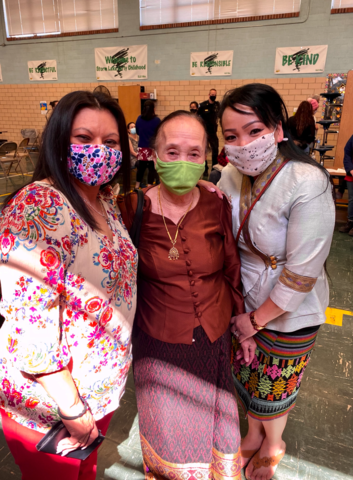
"Engaging with students in multiple colleges is another part of our overarching goal, and the process can be very similar to community engagement," Carvour said. "It's about building trust and relationships and ensuring that we consider each person and group, college, or department, their needs or interests, and how they can be involved in impacting health equity in Iowa."
Carvour and Wilks held several speaking events for college classes, including the College of Medicine and Public Health, to share the work of E-HSP and its health equity objectives with students to encourage and recruit participation to help Iowa communities.
"There isn't a college on campus that doesn't have something to say or some part to play in health equity," Carvour said. "Even though we started with the College of Medicine and Public Health, our goal is to continue expanding and include people who are interested and already doing work in some of these fields."
New partnership opportunities had begun to form with the College of Law and the College of Liberal Arts and Sciences as E-HSP moved into the second year of the grant.
"We have lots of opportunities where students can partner with our program through independent study as well, including a rotation to get focused attention, attend to a specific project, and get mentorship," Wilks said. "E-HSP is open to all programs or departments on campus. We have undergraduate learners, graduate students, Master's, Ph.D., and professional students."
"That's been a model that has worked the best for us so far," Carvour said. "It also allows students to choose the best fit for them in terms of timing and specific projects. It is also an opportunity for those interested in medicine, even if they are a freshman at the University, to get involved with us, work with other med students, and learn about their experiences. That is part of the professional model we are trying to build."
Students who have worked with other colleges and communities during their time with E-HSP have shared their enjoyment in working with other students from across colleges and disciplinary bounds, interacting directly with communities, and working in different environments and settings.
"They're saying this is a way to see how they can apply what they are learning in medicine and public health in a way that matters and advances equity," Carvour said. "We're committed to students having a positive learning experience and access to networks and opportunities they need to promote their professional development. It's truly been a pleasure to work with our student leaders."
E-HSP AS A MODEL FOR PERMANENCE IN ADVANCING HEALTH EQUITY
As the E-HSP team looks from the second to the third year of the grant program, the emphasis is shifting toward establishing a permanent infrastructure within the University of Iowa community to continue advancing health equity in Iowa communities through community engagement.
"We've been able to do things faster than we would have with other grants, where we would have been waiting to hear about them or going through those processes," Carvour said. "University funding has been critical to building the relationships and infrastructure while providing students opportunities that focus on ways to sustain that moving forward."
To support the University research infrastructure and networks, the feedback and partnership support E-HSP has received from local community partners will be critical in sustaining its impact over the long term.
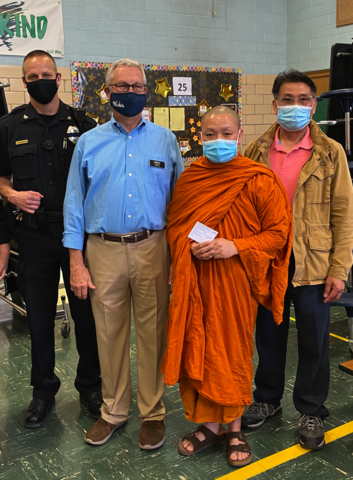
"We need to continue fostering a strong university-community partnership because we work at a public university and are looking out for the public health and clinical care of the public," Carvour said." We don't see a need for an artificial barrier between the two but having co-equal partnerships with our community members and organizations and sustaining that long-term."
E-HSP's success in addressing health equity and access to critical care and services is due to addressing not what researchers think is essential but what community partners say matters and what priorities they see daily in their communities.
"The partnership between Salud! And the University of Iowa was substantial," Storm Lake community member Emilia Marroquin said. "E-HSP gave residents with limited access to health services the opportunity to get their diabetes and blood pressure screened - many things that people have difficulty accessing. It was great to have the E-HSP partnership in Storm Lake."
Story by James Dykeman
~~~
Salud! was featured as a specific example of a university-community partnership impacting an organization through the E-HSP. Numerous partnerships exist as the program continues to impact Iowa communities through health equity community engagement. Here are some of those other connections in the Storm Lake area:
|
SALUD! |
Seasons Centers for Behavioral Health |
Family Crisis Centers |
|
Buena Vista Regional Medical Center |
Buena Vista Regional Medical Center -Fitness and Health |
Iowa Legal Aid-Farmer's Rights Project |
|
Buena Vista County |
United Community Health Center |
Vision Care Associates P.C |
|
Jackson Center |
United Community Health Center-Dental Clinic |
Heartland Counseling |
|
Tyson Corporation |
Storm Lake United |
Storm Lake United Methodist Church |
|
St. Mark Church
|
Lutheran Services in Iowa |
Ayudanos a Ayudar |
